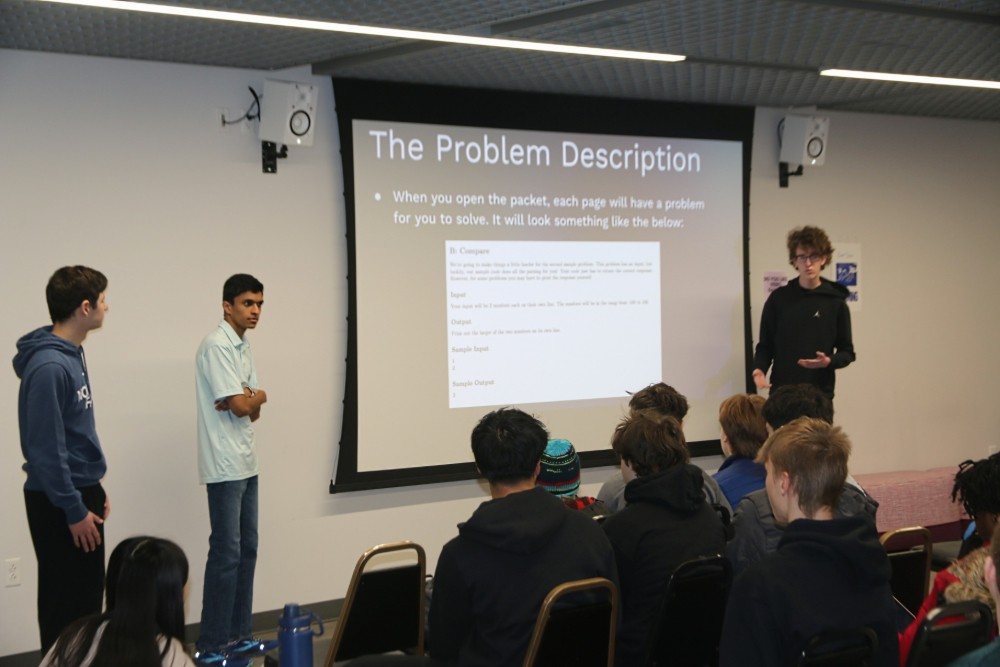About sixty students participated in the inaugural youth-led coding competition held at the Arlington Career Center this past weekend, marking a significant achievement for student organizers and participants alike.
“We had to communicate with many people – it was quite an effort,” remarked Nate Levin, a Yorktown High School senior who spearheaded the 4.5-hour event alongside Brayden Zee, also from Yorktown, and Sheel Shah of Arlington Tech. These three dedicated computer-science students at the Arlington Career Center leveraged their firsthand experiences from regional computer-coding events to bring a similar opportunity to their local community. The competition welcomed students from sixth through twelfth grade, fostering a broad range of participation.
“The primary goal was to make it engaging and fun,” explained Shah, highlighting a unique aspect of their event. Unlike many coding competitions that primarily target high schoolers, this one successfully attracted and included numerous middle school teams, broadening access to competitive coding for younger students.
The event officially launched as the Arlington Public Schools HSPC (High School Programming Contest), a testament to the students’ initiative. For those who were hesitant about joining, the organizers provided a helpful primer, outlining the essence of a programming contest: a challenge where teams race against the clock to solve concise algorithm-design problems with both speed and accuracy.
To illustrate the challenge levels, they offered examples ranging from beginner-friendly tasks like “Print, ‘Hello, World!’” to more complex problems such as “Write a program that detects whether a string of parentheses is properly matched.” While basic programming knowledge was recommended, the competition remained open to all interested students, emphasizing inclusivity.
Zee, the coding lead of the Yorktown robotics team, played a crucial role in managing the event’s back-end software development and technical support. Reflecting on his efforts, Zee shared his benchmark for success: “If everything worked and nothing failed.” He aimed for a seamlessly functioning event, a common aspiration for any tech-driven competition.
Inevitably, technical glitches are part of such events. An initial login issue faced by competitors was addressed promptly, coinciding with the timely arrival of pizzas, providing much-needed sustenance for the young coders as they tackled the challenges ahead.
Computer-coding competitions represent a specialized field. Observers unfamiliar with coding languages like Python and Java, the two languages used in the competition, could only observe with a sense of awe as teams immersed themselves in problem-solving, submitting their solutions to an online judging system.
Participants engaged in the traditional method of working out coding solutions using pencil and paper. Each team was allowed a single laptop to upload their completed work for scoring. Importantly, access to phones or the internet for external assistance was restricted, promoting independent problem-solving skills.
A supportive environment was fostered: teams were not penalized for incorrect answers, and middle school teams were offered hints when they encountered difficulties, encouraging learning and perseverance.
Observing the competition were Jeff Elkner and Chris Jones, computer-science instructors at the Career Center. Both instructors lauded the students for their initiative in bringing this competition to life.
“They did everything,” acknowledged Elkner, who has extensive experience accompanying students to coding competitions over the years. Jones echoed this sentiment, describing the event’s realization as “incredible, so cool.” He added, “They did an amazing job. We’re delighted,” emphasizing the instructors’ pride and satisfaction.
Levin, Shah, and Zee shared that their passion for coding ignited between the ages of 8 and 11, demonstrating the potential for early engagement in computer science. Smith underscored the broader relevance of coding skills, stating, “Coding is an important skill, a tool you can apply to anything. Everyone can benefit,” even beyond those pursuing tech careers.
Elkner concluded by emphasizing the contemporary significance of coding: “Our world is the 21st-century world. Coding is a chance to get better connected to your world.” The Arlington Career Center’s debut coding competition not only provided a platform for young computer science enthusiasts but also highlighted the growing importance of programming skills in today’s world, skills that are increasingly valuable in various career paths, even if not directly at a career fair, but certainly in the broader job market. This event serves as a stepping stone for future student coding competitions and inspires the next generation of tech-savvy individuals.

